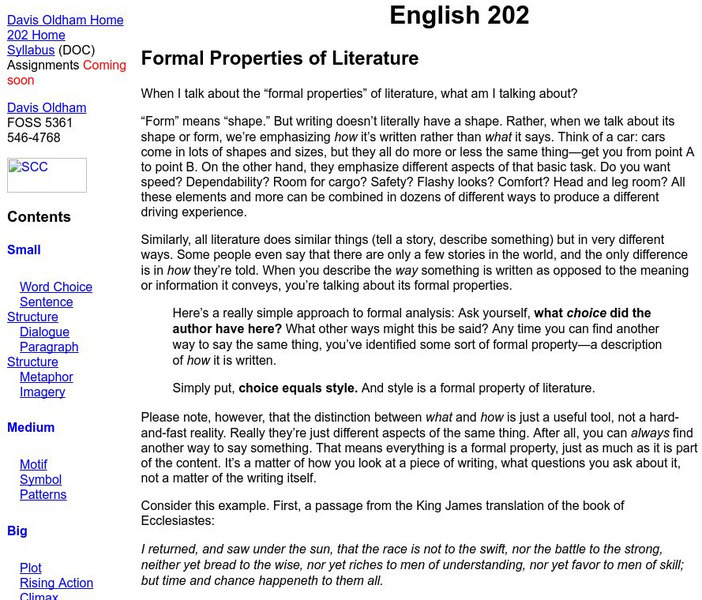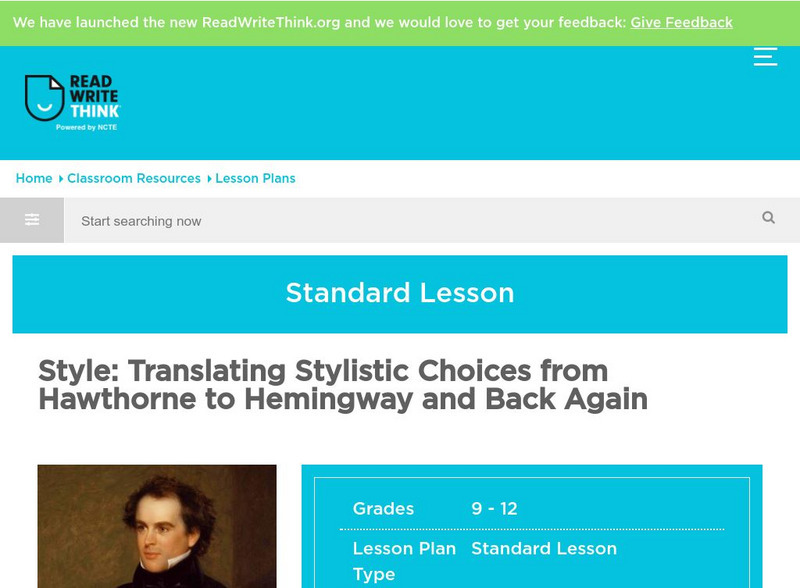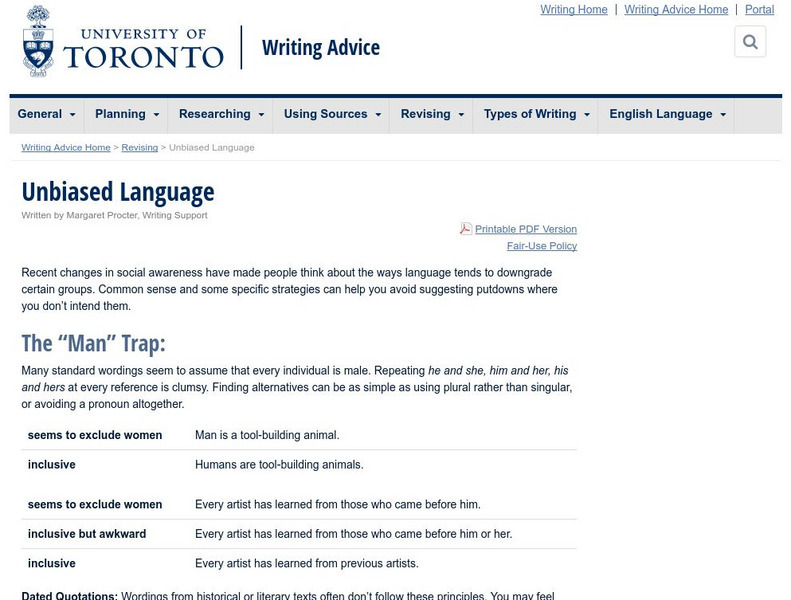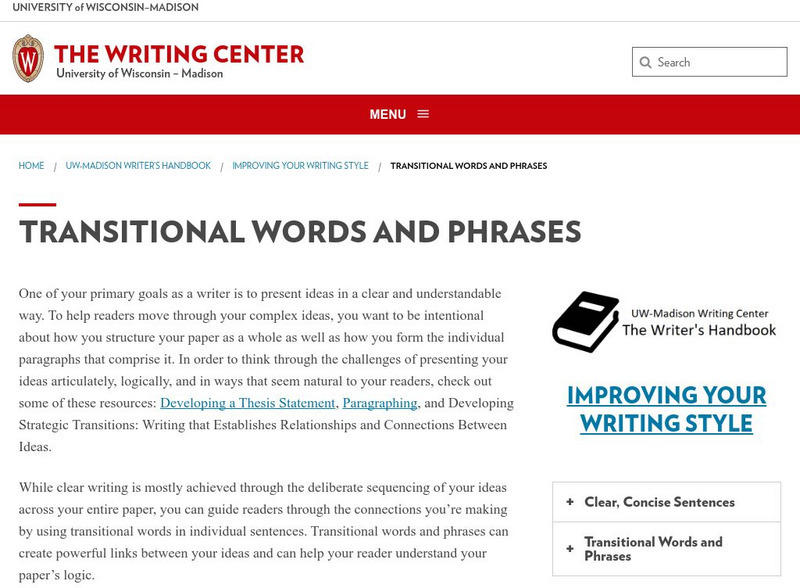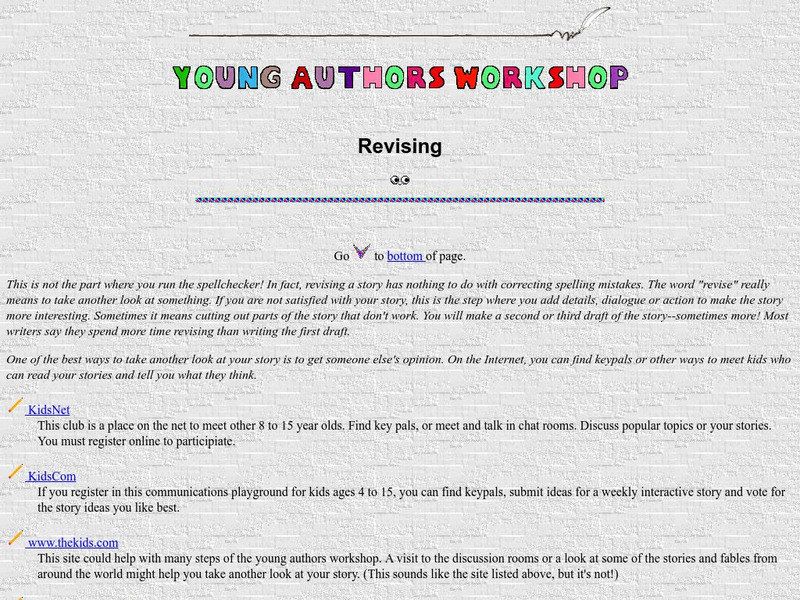Capital Community College Foundation
Guide to Grammar and Writing: Sentence Subject
Part of larger website devoted to sentence structure, grammar, and writing skills, this tutorial teaches the subject of a sentence--the person, place, thing, or idea that is doing or being something.
Capital Community College Foundation
Guide to Grammar and Writing: Using Numbers, Writing Lists
A lengthy page of rules regarding how to use numbers in writing, as well as how to write lists. Very helpful.
Other
The Editing Process: Paradigm Online Writing Assistant
What does the editing process consist of for your students? Use this informative site to learn more about editing.
Other
Writing Scientific Reports
This tutorial site provides links to articles about writing a scientific report or essay as well as to sample essays.
Other
Literature Unit: "A Day No Pigs Would Die"
This site features questions for each of the chapters in Robert Newton Peck's "A Day No Pigs Would Die."
Other
Shoreline Community College: Formal Properties of Literature
As students become more aware of text complexity, an understanding of the formal properties of literature becomes more important. This is an excellent examination of the kinds of choices writers make that change the way readers receive...
ReadWriteThink
Read Write Think: Peer Review: Narrative
Excellent lesson plan that teaches a new and more relevant way of conducting a peer review. Through the PQP (Praise-Question-Polish) process students gain a greater understanding of how to review others' work as well as improve their own...
ReadWriteThink
Read Write Think: Style Choices of Hemingway and Hawthorne
Lesson plan which helps students understand the impact of the literary element of style on a piece of writing. Students read and analyze the works of Ernest Hemingway and Nathaniel Hawthorne. L.11-12.3 Language Functions/Style,...
Authors Calendar
Author's Calendar: Truman Capote
The creator of the "nonfiction novel," Truman Capote, who established his career as a Southern gothic writer, crossed the line between journalism and fiction. This biography provides his background and information about his writing and...
Grammarly
Grammarly Handbook: Sentence Style
A list of three techniques used to develop sentence style: Sentence Variety, Sentence Emphasis, and Wordiness. Each technique links to more information.
Capital Community College Foundation
Guide to Grammar and Writing: Sentence Combining Skills
Students sometimes have difficulty learning to combine sentences correctly and effectively. This site discusses several methods and provides practice opportunities and quizzes.
University of Toronto (Canada)
University of Toronto: Unbiased Language
Resource acknowledges the changes in social awareness and how language is influenced by it. It presents suggestions as to how to avoid bias in writing. Some of the changes in terminology can have subtle differences in meaning. W.9-10.1d...
Sophia Learning
Sophia: Punctuation and Style
A nine-slide presentation discussing how to use punctuation to create or reflect the author's style. W.9-10.1d Style/tone/conv
Robin L. Simmons
Grammar Bytes: The Item in a Series
This site is concerned with writing any kinds of items in a series. It verbally and graphically illustrates parallel structure, and shows how to punctuate a series.
The English Teacher
The English Teacher: Writing Analogies
Analogies are useful when communicating ideas that a reader wouldn't otherwise understand. This tutorial explains how to use analogy in writing.
Shmoop University
Shmoop: Julius Caesar Analysis: Literary Devices in Julius Caesar
A discussion of the literary devices used by Shakespeare in The Tragedy of Julius Caesar. Each device is linked to additional pages with more detailed information and examples.
Online Writing Lab at Purdue University
Purdue University Owl: Writing Numbers
Straightforward tutorial explaining the rules about numbers in writing.
University of Wisconsin
University of Wisconsin: Using Transitions: Transitional Words and Phrases
Tables of words that show different types of sentence transitions. W.9-10.1c cohesion/clarity/reason, W.9-10.2c cohesion/clarity/transitions. CCSS.ELA-Literacy.CCRA.W.4, W.11-12.1c Transitions/Cohesion, W.11-12.2c Transition/Cohesion....
English Club
English Club: Punctuation Styles
This EnglishClub tutorial expounds upon the differences in punctuations styles that exist among individual writers, British and American authors, and publishers.
Khan Academy
Khan Academy: Style and Technique
Use context to figure out how to use language appropriately--formality, irony, understatement, and overstatement.
Grammar Tips
Ten Common but Easily Corrected Errors
This resource presents the easiest errors to make when writing. Use this resource to help you proof your work.
Other
Polynesian University: Academic Writer: Analogy
Describes different writing strategies to be used with analogies to help get a point across. Gives three good examples.
Other
Young Author's Workshop: Revising
Revise means to take another look at something. If you are not satisfied with your story, this is the step where you add details, dialog, and action to make the story more interesting.
Other
Spelling police.com: Analogy
Informational site that provides the definition for and examples of analogy.





